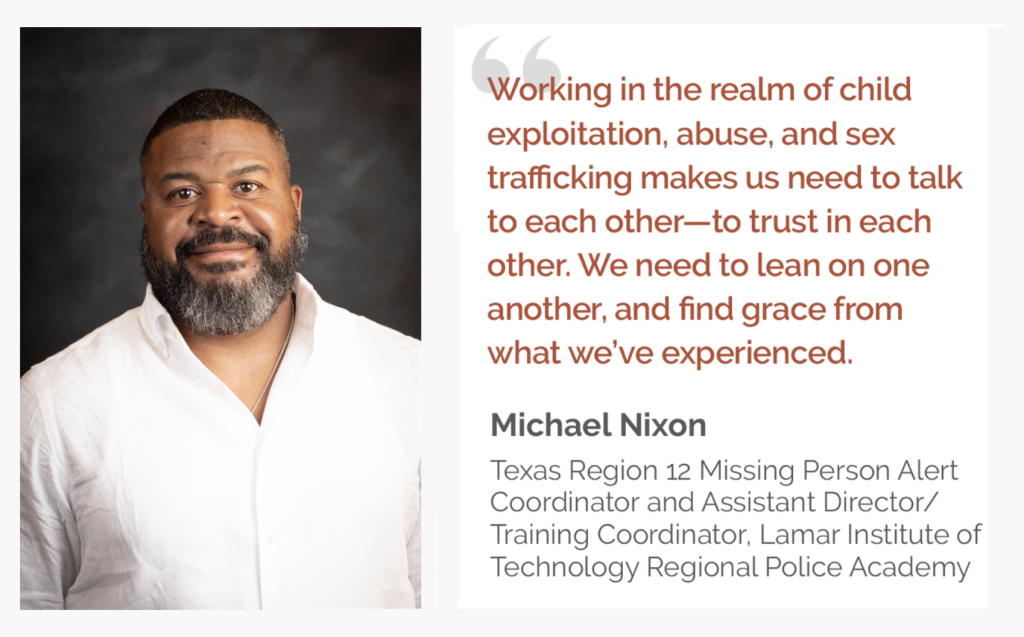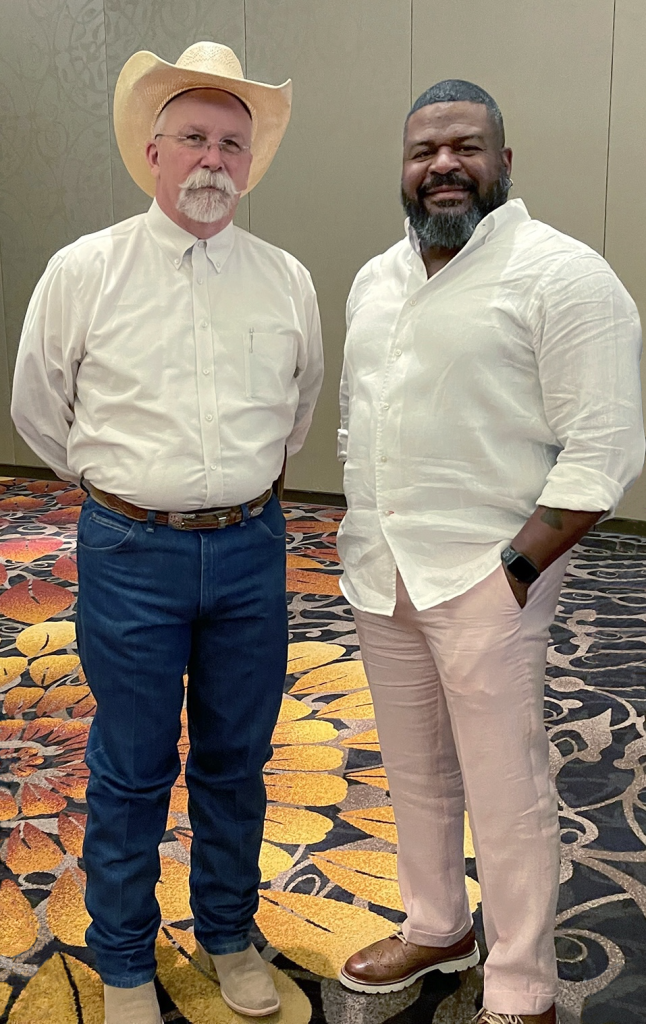 By Denise Gee Peacock
By Denise Gee Peacock
Michael Jude Nixon’s middle name is his mother’s homage to Saint Jude, “the patron saint of hope and hopeless causes,” Nixon says. “She had a rough time during her pregnancy with me, and found comfort in prayer,” he says. “Thankfully everything turned out OK.”
And thankfully for those in his hometown of Beaumont, Texas, Nixon has devoted his life to serving people in need of hope—people facing hopeless causes.
“My family taught me to recognize a higher purpose in life,” says Nixon, who retired five years ago as a detective with the Beaumont Police Department, where he worked for almost 16 years and was the department’s AMBER Alert Coordinator.
Nixon now serves in two broader-ranging law enforcement capacities. Since 2020 he has held the role of Region 12 Missing Person Alert Coordinator for the Texas Department of Public Safety. (Region 12, comprising six counties in the Beaumont area, is home to about 500,000 people in southeastern Texas near southern Louisiana.)
Since 2020, Nixon has worked as Assistant Director and Training Coordinator for the Lamar Institute of Technology (LIT) Regional Police Academy in Beaumont. And on the national front, he recently joined Team Adam, a seasoned group of law enforcement professionals tapped for rapid deployment by the National Center for Missing & Exploited Children to investigate missing child cases.
Nixon’s path into law enforcement followed a decade of doing manual labor for the City of Beaumont.
The first half of that chapter was working in water maintenance for five years, and for the next five “dealing with alligators, snakes, you name it” as an animal control officer. The arduous, all-hours work “was difficult, but important,” he says. “It just didn’t pay enough to help me make ends meet” for his young family, and kept him from home a lot.
Some friends at the Beaumont Police Department encouraged him to join the BPD.
But then came Hurdle One. “Initially, I was provided a job offer, but it was rescinded after they learned I had a GED instead of a high school diploma.” (Nixon earned a GED at 18 after enlisting in the U.S. Army Reserve.) Undaunted, he returned to high school at age 32 and received that diploma. That allowed him to train at LIT and join the BPD in 2004.
Next came Hurdle Two: navigating the traumas associated with crimes against children—from child abuse to sex trafficking cases, which he was responsible for investigating for much of his BPD career.
The way he managed to cope (see “Take 5” section below) now informs his Regional Police Academy training work at LIT. It also has spurred him to continue expanding his horizons for both personal and professional growth. In December 2023 he earned his Associate of Science degree in criminal justice from LIT, and currently is pursuing a bachelor’s degree in the discipline from Lamar University.
We recently caught up with Nixon so we could learn more about his work experiences—and also glean his advice that others could apply to their work lives.
How did your world change after becoming a police officer? Working for the water department and as an animal control officer prepared me well. I saw the downside of humanity in those roles, and it was humbling. That makes you a more empathetic person. I was able to carry that over into law enforcement. I realized that everybody I encountered was somebody’s child, somebody’s parent, somebody’s loved one. I credit that to my mom’s influence. She taught me to be nice to people, even if you can’t do anything else to help.

What were some challenges you faced in your law enforcement work? Earning people’s trust, for one. Also, getting them to talk. Many small-town communities that have been mistreated or ignored by law enforcement have built up a wall, a mentality of ‘us versus them.’ That wall has to be continually torn down by both cops and citizens, Black and White alike. That’s because any national incident of police brutality will overshadow hundreds if not thousands of positive incidents, so it’s an uphill battle that we have to learn from. It doesn’t do us any good to be overzealous or condescending. As my mother always said, ‘You can catch more flies with honey.’ And when someone extends an olive branch, take it. I made an effort to go to park events and parades, to meet people on their level. We may not be welcomed at first—or the second time or third time—but we shouldn’t give up.
How did that affect cases involving missing children? When a community doesn’t trust law enforcement they’ll think they can solve a problem faster and more effectively on their own—of not getting the police involved. That’s especially true because most AMBER Alerts we handle are family-related and not stranger abductions, so people figure an outsider won’t be much help. I’ve had to work hard to convince them that I’m on their side. One challenge comes when children have been lured into sex trafficking. You have about four seconds to make a positive impression before they close their minds to you. Most have been told not to trust law enforcement; to be afraid that a cop will victimize them.
Do you cross paths with some of the children you helped over the years? I see a lot of them quite frequently, but very few know who I am. That’s by design; our child advocacy center is their true liaison. But their parents tend to know who I am. Often they’re people I grew up with. And sometimes they’ve come to me for guidance. I feel good when I can help.
Take 5: Ways to keep stress in check
Dealing with the disturbing realities of child protection work is a major stressor for law enforcement. “So many of us compartmentalize all the things we see,” Michael Nixon says. “We tell everybody that we’re fine when we’re not.” Here is some of his hard-won wisdom.
 Share your feelings with a trusted friend or professional. “Around the time of my retirement, everything I’d dealt with over the years was causing me to have sleepless nights, to feel anxious. And I’m not ashamed to admit that I decided to talk with a therapist. He helped me see I was finally ‘man enough’ to admit the issues I was having. That’s why I tell our police academy cadets, ‘If you’re not feeling well, talk to someone,’ Nixon says. “It also helps to talk with colleagues who’ve had the same experiences as you.”
Share your feelings with a trusted friend or professional. “Around the time of my retirement, everything I’d dealt with over the years was causing me to have sleepless nights, to feel anxious. And I’m not ashamed to admit that I decided to talk with a therapist. He helped me see I was finally ‘man enough’ to admit the issues I was having. That’s why I tell our police academy cadets, ‘If you’re not feeling well, talk to someone,’ Nixon says. “It also helps to talk with colleagues who’ve had the same experiences as you.”
Leave work at work. “One of the best decisions I ever made was never talking with my family about any bad things that I had seen during the day. The boogeyman is not welcome at my house.”
Do a wellness check—on yourself. “Everyone—but especially those in law enforcement—should practice self-care,” Nixon says. “Find a way to step back, take a deep breath, and decompress. For instance, in an active shooter situation, we may run on adrenaline until there’s a break in the action. That’s when we’re supposed to check ourselves for wounds we may not be aware of. The same goes for investigating crimes against children. Check yourself every 12 hours to ensure you’re OK.”
Fortify your body and mind. “I found strength, and stress relief, by going to the gym each day, or working on some property I own in the country, clearing trees and that sort of thing. This kind of exercise can make you stronger physically and mentally.”
Don’t be afraid to cry. “Shedding tears is a body’s way of cleansing itself after a traumatic situation,” Nixon says. “Whenever you need some relief, find an empty office, or go sit in your car, and do what you need to do to lift that weight from your shoulders. Doing that will help you move forward.”
“Most people will experience a traumatic incident maybe five to seven times in their entire life. Meantime, a cop may experience a traumatic incident five to seven times a shift.”
Michael Nixon
